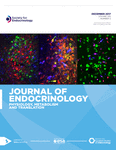The mammalian START domain protein family in lipid transport in health and disease
- Department of Biochemistry and Molecular Biology, and the Center for Genetics and Molecular Medicine, School of Medicine, University of Louisville, Louisville, Kentucky 40292, USA
- (Correspondence should be addressed to B J Clark; Email: bjclark{at}louisville.edu)
Abstract
Lipid transfer proteins of the steroidogenic acute regulatory protein-related lipid transfer (START) domain family are defined by the presence of a conserved ∼210 amino acid sequence that folds into an α/β helix-grip structure forming a hydrophobic pocket for ligand binding. The mammalian START proteins bind diverse ligands, such as cholesterol, oxysterols, phospholipids, sphingolipids, and possibly fatty acids, and have putative roles in non-vesicular lipid transport, thioesterase enzymatic activity, and tumor suppression. However, the biological functions of many members of the START domain protein family are not well established. Recent research has focused on characterizing the cell-type distribution and regulation of the START proteins, examining the specificity and directionality of lipid transport, and identifying disease states associated with dysregulation of START protein expression. This review summarizes the current concepts of the proposed physiological and pathological roles for the mammalian START domain proteins in cholesterol and lipid trafficking.
- Received in final form 27 September 2011
- Accepted 30 September 2011
- Made available online as an Accepted Preprint 30 September 2011
- © 2012 Society for Endocrinology











